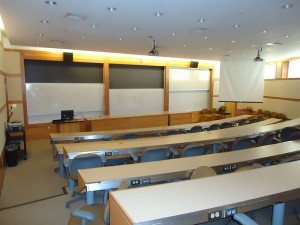 I recently had the opportunity to guest lecture for an American Government class at a private Midwestern college. My friend who teaches the class invited me to share some insights about political theory. While I have taught classes to select groups of motivated students, I was ill prepared for the harrowing experience of addressing the ordinary university student.
I recently had the opportunity to guest lecture for an American Government class at a private Midwestern college. My friend who teaches the class invited me to share some insights about political theory. While I have taught classes to select groups of motivated students, I was ill prepared for the harrowing experience of addressing the ordinary university student.
Is Technology Ruining Your Life? Take A Quick Quiz To Find Out By Clicking Here.
The 25 or so students entered into the classroom and plopped into their seats. I immediately tried my best to connect with them by explaining some basic concepts of government and law. It proved very difficult since most of the students, although polite, were simply not interested in the topic. Some three or four students carried on the class discussion. I thought I had failed miserably until my friend later commented that he was pleased to see how much interest the class had generated.
My experience was hardly unique.
I have spoken with other professors who have had similar experiences. There may be a few fine students who really do want to learn and are highly motivated, but there are also many students who simply don’t want to be in their classes. They are there because they are required to be there to graduate. Moreover, many students feel a university degree is a kind of entitlement that they have the right to claim despite their performance in the classroom.
Anyone who is involved in education will acknowledge the mechanical nature of the modern education process. The university is often focused on granting ever more degrees, securing larger enrollments or raising massive funds. This can lead to the lowering of standards or overlooking problems like cheating and plagiarism in order to keep enrollment numbers high, so as to keep federal funds flowing.
As a result, something very important has been lost in higher education. In our efforts to leave no child behind, we are leaving teachers and professors behind. We are turning our professors into mere monitors of testable information rather than mentors who guide their students to develop character and wisdom. We are asking them to conform to politically correct agendas, instead of giving students a vision of society based on reality and a notion of truth. Professors cannot advance in the practice of doing that which they should be doing: real teaching. They are being left behind.
It is an example of what I call the “frenetic intemperance” of our times where the higher purposes of education are left behind and the concrete results of numbers are highlighted as success. It involves sending people to college for the sake of going to college.
What is particularly tragic about this whole mentality is the obsessive idea that more is better. Those who hold this view believe that if students with degrees earn more than those without, then all students must be granted degrees, any degree, regardless of their abilities or debts contracted.
The recent proposal to grant all students two “free” years of community college is an example of this numbers mindset. It does not get to the core of the matter. Rather, the proposal will end up filling more classrooms with “students” who really don’t want to be there. It will occupy more professors with processing, not teaching, students. It will saddle taxpayers with the bill to pay for the “free” education that fails to educate.
Higher education should be for students who want to be there. It should be for those who  have a passion for the subjects for which they study. Contrary to so many who now enter the university system, students should have a clear notion of what they are going to do with their degrees…and how they are going to pay for them.
have a passion for the subjects for which they study. Contrary to so many who now enter the university system, students should have a clear notion of what they are going to do with their degrees…and how they are going to pay for them.
Higher education should also be for professors who want to profess, not monitor. They should be free to communicate their passion for study, knowledge and truth to their students. In our folly, to push students ahead, we must not leave our professors behind.
As seen on, TheBlaze.com


